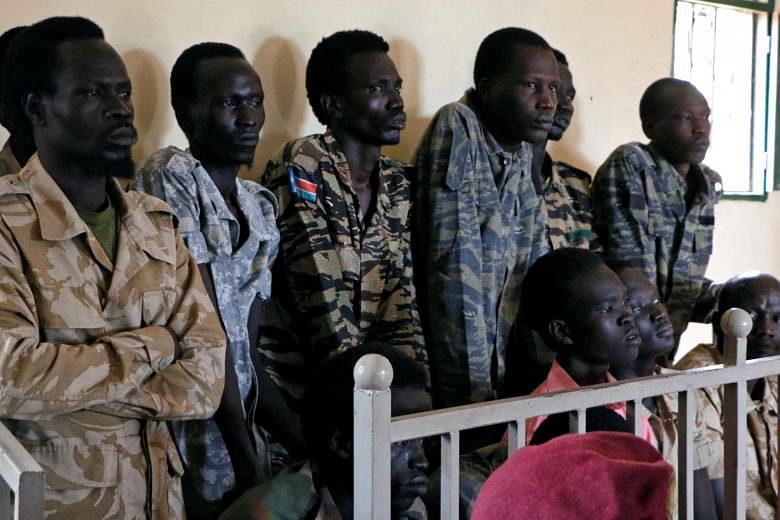JUBA, South Sudan (AFP) - A South Sudan military court on Tuesday (May 30) began the trial of 13 soldiers accused of raping foreign aid workers and murdering a local journalist during fighting in Juba last July.
The chilling attack cast a spotlight on atrocities by government troops but also led to a damning probe into the failure of United Nations peacekeepers to protect civilians, which led to the sacking of the force's Kenyan commander.
The suspects appeared in court in a variety of uniforms indicating attachment to different units, including four in the colours of the "Tiger Division" which guards the president. There are no senior commanders among the accused.
The trial was adjourned after military prosecutor Abubakr Mohamed Ramadan failed to produce a charge sheet detailing which crimes each of the suspects was accused of.
Civil war broke out in South Sudan in 2013 when President Salva Kiir accused his former deputy Riek Machar of plotting a coup.
An August 2015 peace deal collapsed last July when fierce fighting erupted in Juba between forces loyal to Kiir and Machar.
A Human Rights Watch report documented targeted ethnic killings, rapes and gang rapes, beatings and looting during the clashes.
The report describes how on July 11, government forces attacked the Terrain hotel compound housing some 50 employees of foreign organisations.
Giving evidence on Tuesday, the hotel's British owner, Mike Woodward, said that "50 to 100 armed soldiers" broke into the compound.
"One group proceeded straight to the bar and restaurant while another group continued to the residential area," he said.
Woodward listed "the gang rape of at least five international women", the murder of a South Sudanese journalist, the shooting of a US aid worker and "the beating and torture of almost every person in the entire building", including mock executions, among the crimes allegedly committed at his hotel.
Woodward's testimony is supported by reports compiled by the UN and HRW.
Witnesses and survivors told HRW how the soldiers "killed a prominent journalist, raped or gang raped several international and national staff of organisations, and destroyed, and extensively looted property."
Female aid workers were threatened at gun point, with one beaten with a rifle butt while another soldier fired a bullet close to her head, HRW reported.
During the attack the aid workers made multiple appeals for help, which went unanswered.
"Many residents were not rescued for several hours, despite repeated calls to various organisations and security forces. During and after the rescues, the soldiers continued to ransack and loot the compound leaving nothing intact," HRW said.
The body of murdered local journalist John Gatluak was not retrieved for several days.
A subsequent report from a special UN investigation showed that the agency's UNMISS peacekeepers stationed just 1.2km away failed to respond to the rescue calls.
There were multiple requests made to the peacekeepers from China, Ethiopia, India and Nepal to dispatch forces "but each UNMISS contingent turned down the request, indicating their troops were fully committed".
The report found that a lack of leadership in the UN mission, which has some 13,000 uniformed personnel in South Sudan, culminated in a "chaotic and ineffective response" during the July fighting.
The trial resumes on 6 June.

